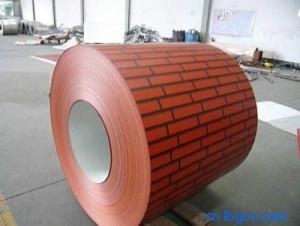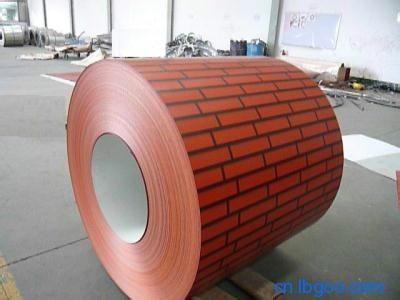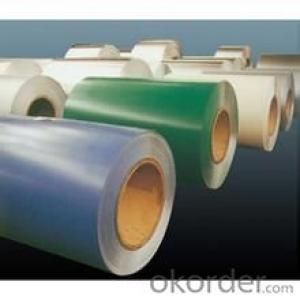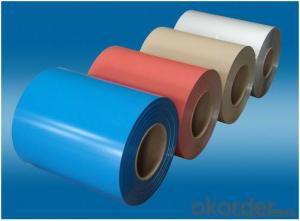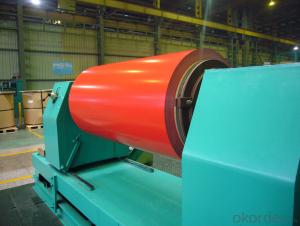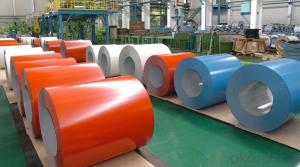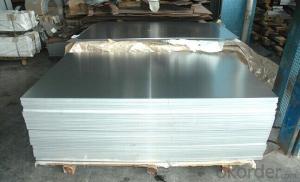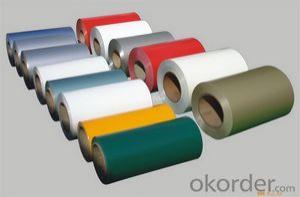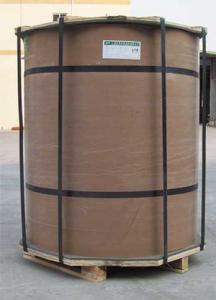12 Inch Aluminum Sheet Metal Coil - New Coated Aluminum Coil-3XXX
- Loading Port:
- China Main Port
- Payment Terms:
- TT OR LC
- Min Order Qty:
- -
- Supply Capability:
- -
OKorder Service Pledge
OKorder Financial Service
You Might Also Like
Product Description:
1 Specifications of PE Coated Aluminum Coil/Sheet
Alloy | AA1050,AA1060, AA1070, AA1100, AA3003, AA3004, AA3005, AA3105, AA5005, AA5052, AA5754, AA5083, AA8011 |
Temper: | H12, H14, H16, H18, H22, H24, H26, H32,HO, F |
Thickness: | 0.10-4.0mm |
Width: | 10mm- 2000mm |
Coating | PE(Polyester) |
Painting Thickness | Standard 16-25 microns, max 40 microns |
Color | Acording to Ral colors or customer’s samples |
Standard: | GB/T17748-1999, ASTM, ISO, EU standard |
Special Specification is available on customer’s requirement | |
Paint Material:PPGI,BECKER, NIPPON.
PE(polyester) Coating
PVDF
2 Usage/Applications of PE Coated Aluminum Coil/Sheet
Our company's PE Coated Aluminum Coil/Sheet have been widely used in the fields of construction and decoration(garage doors, ceiling etc.), electronic appliances, lighting decoration, air-condition air pipe, sanwich panels and drainage, etc.
- Q: What are the common surface finishes available for aluminum coils?
- The common surface finishes available for aluminum coils include mill finish, anodized finish, painted finish, and laminated finish.
- Q: What is the minimum thickness available for aluminum coils?
- The minimum thickness available for aluminum coils can vary depending on the specific requirements of the application. However, in general, aluminum coils can be manufactured with a minimum thickness of around 0.006 inches or 0.15 millimeters. It is important to note that certain industries or uses may have different minimum thickness requirements, so it is always advisable to consult with a manufacturer or supplier to determine the appropriate thickness for a specific application.
- Q: This question asks for a comparison of various types of equipment used for welding aluminum coils, highlighting their distinct features and applications.
- <p>Aluminum coil welding equipment varies based on technology, power source, and application. TIG (Tungsten Inert Gas) welders are known for high-quality welds and are ideal for thin aluminum coils. MIG (Metal Inert Gas) welders are versatile and suitable for thicker coils, offering faster welding speeds. Stick welders are more portable and cost-effective but produce lower quality welds. Laser welders provide precise, deep penetration welds suitable for high-precision applications. Friction stir welding is a solid-state process that offers excellent joint properties without melting the metal. Each type has its advantages and is chosen based on the specific requirements of the welding task, such as material thickness, weld quality, and production rate.</p>
- Q: This question asks about the potential health impacts of aluminum coils, which are commonly used in various industries and products.
- <p>Aluminum coils themselves are generally considered safe and do not directly affect health when used in their typical applications such as construction, electrical components, or food packaging. However, there is ongoing debate about the potential health risks of aluminum exposure, particularly when ingested. Some studies suggest a link between aluminum and neurological disorders like Alzheimer's disease, though this is not conclusively proven. It's important to note that aluminum is a common element found naturally in the environment, and the human body can naturally excrete small amounts. The use of aluminum coils in food packaging is regulated to ensure safety, and the risk of aluminum toxicity from these sources is considered low.</p>
- Q: Can aluminum coils be used for outdoor applications?
- Yes, aluminum coils can be used for outdoor applications. Aluminum is highly resistant to corrosion and weathering, making it a suitable choice for outdoor use. Additionally, aluminum coils are lightweight, durable, and have excellent thermal conductivity, making them ideal for various outdoor applications such as roofing, gutters, and HVAC systems.
- Q: What is the impact resistance of aluminum coils?
- The specific impact resistance of aluminum coils may vary depending on the alloy and temper of the aluminum. In general, aluminum is renowned for its excellent impact resistance due to its inherent strength and ductility. Aluminum coils find extensive use in industries like automotive, construction, and packaging, where they are likely to encounter impact or mechanical stress. Manufacturers frequently employ aluminum alloys like 3003, 5052, or 6061 for coil production. These alloys are recognized for their high tensile strength, which contributes to their impact resistance. Furthermore, aluminum possesses the capability to absorb and distribute energy upon impact, thereby reducing the likelihood of damage or deformation. It is important to note, however, that various other factors can influence the impact resistance of aluminum coils. These factors include coil thickness, surface finish, and the presence of additional protective coatings or treatments. Generally, thicker coils offer greater impact resistance, while coatings or treatments can enhance durability and resistance to impact. In conclusion, the impact resistance of aluminum coils can generally be considered satisfactory. However, it is advisable to consult with a manufacturer or supplier to ascertain the specific impact resistance properties of the chosen aluminum alloy and coil.
- Q: I did a activity series lab and on my data table, it shows that lead reacted more than aluminum did, but aluminum is more active than lead. So, why does it show that lead is more active when it really isn't? Is it human error?
- Aluminum is more active than lead. You should double check your activity data table. If you confirm that the table says that lead is more active than aluminum, the table is in error.
- Q: Are aluminum coils suitable for curtain wall systems?
- Curtain wall systems can greatly benefit from the use of aluminum coils. This lightweight and durable material offers a multitude of advantages. Firstly, aluminum coils possess excellent corrosion resistance, ensuring the long-lasting and sturdy nature of the curtain wall system. This makes them particularly well-suited for exterior applications, where exposure to various weather conditions is inevitable. Moreover, aluminum does not rust, setting it apart from materials like steel. In addition, aluminum coils can be easily extruded into a wide range of shapes and sizes, allowing for flexibility and creativity in the design of curtain walls. This grants architects and designers the opportunity to create visually appealing and distinctive structures. Another notable feature of aluminum is its high sustainability. It is completely recyclable, meaning that it can be reused without any loss in quality. This makes aluminum coils an environmentally friendly choice for curtain wall systems, aligning with the growing demand for sustainable building materials. Furthermore, aluminum possesses excellent thermal and electrical conductivity, which can contribute to energy efficiency in curtain wall systems. By incorporating thermal breaks and insulation, aluminum curtain walls can effectively regulate temperature and reduce energy consumption, resulting in long-term cost savings. In conclusion, aluminum coils are an outstanding option for curtain wall systems due to their resistance to corrosion, versatility, sustainability, and energy efficiency.
- Q: Can aluminum coils be recycled multiple times?
- Yes, aluminum coils can be recycled multiple times. Aluminum is a highly recyclable material, and the recycling process for aluminum coils involves melting them down to create new coils. This means that aluminum coils can be recycled indefinitely without losing their properties or quality.
- Q: Can aluminum coils be used in high-temperature applications?
- Yes, aluminum coils can be used in high-temperature applications. Aluminum has a high melting point of 660 degrees Celsius (1220 degrees Fahrenheit), which makes it suitable for various high-temperature environments. Additionally, aluminum has excellent thermal conductivity, allowing it to efficiently transfer heat, making it a popular choice for heat exchangers and HVAC systems. However, it is important to note that the specific application and temperature requirements should be considered, as extremely high temperatures beyond the melting point of aluminum may require alternative materials.
Send your message to us
12 Inch Aluminum Sheet Metal Coil - New Coated Aluminum Coil-3XXX
- Loading Port:
- China Main Port
- Payment Terms:
- TT OR LC
- Min Order Qty:
- -
- Supply Capability:
- -
OKorder Service Pledge
OKorder Financial Service
Similar products
Hot products
Hot Searches
Related keywords
